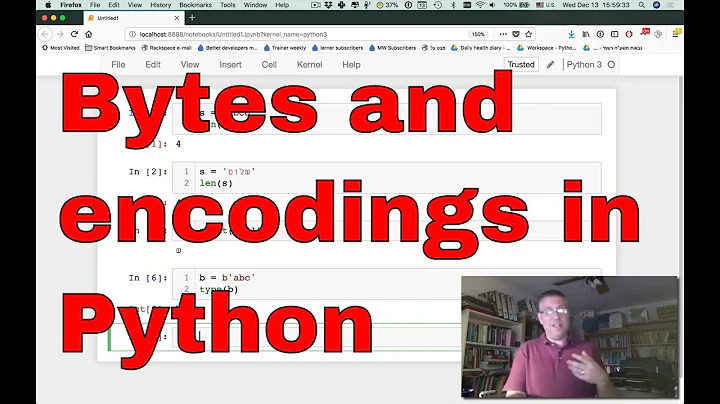How to detect string byte encoding?
94,442
Solution 1
if your files either in cp1252 and utf-8, then there is an easy way.
import logging
def force_decode(string, codecs=['utf8', 'cp1252']):
for i in codecs:
try:
return string.decode(i)
except UnicodeDecodeError:
pass
logging.warn("cannot decode url %s" % ([string]))
for item in os.listdir(rootPath):
#Convert to Unicode
if isinstance(item, str):
item = force_decode(item)
print item
otherwise, there is a charset detect lib.
Python - detect charset and convert to utf-8
https://pypi.python.org/pypi/chardet
Solution 2
Use chardet library. It is super easy
import chardet
the_encoding = chardet.detect('your string')['encoding']
and that's it!
in python3 you need to provide type bytes or bytearray so:
import chardet
the_encoding = chardet.detect(b'your string')['encoding']
Solution 3
You also can use json package to detect encoding.
import json
json.detect_encoding(b"Hello")
Related videos on Youtube
Author by
Philipp
Updated on February 24, 2022Comments
-
Philipp about 2 years
I've got about 1000 filenames read by
os.listdir(), some of them are encoded in UTF8 and some are CP1252.I want to decode all of them to Unicode for further processing in my script. Is there a way to get the source encoding to correctly decode into Unicode?
Example:
for item in os.listdir(rootPath): #Convert to Unicode if isinstance(item, str): item = item.decode('cp1252') # or item = item.decode('utf-8') print item -
Taras Vaskiv almost 6 yearsSeems to me it doesnt work. I have created string variable and encoded it utf-8. chardet returned TIS-620 encoding.
-
Martin Haeberli about 5 yearsI found that cchardet appears to be the current name for this or a similar library...; chardet was not findable.
-
 Yoav Vollansky almost 5 yearsA bit confused here. It seems like it isn't possible to provide an str class as an argument. Only b'your string' works for me, or directly providing a byte variable.
Yoav Vollansky almost 5 yearsA bit confused here. It seems like it isn't possible to provide an str class as an argument. Only b'your string' works for me, or directly providing a byte variable. -
artfulrobot over 4 yearsThe problem with this answer for me is that some cp1252/latin1 characters can be interpreted as technically valid utf8 - which leads to
êtype characters where it should have beenê.chardetseems to try utf8 first, which results in this. There may be a way to tell it which order to use, but lucemia's answer worked better for me. -
artfulrobot over 4 years↑ sorry, I think I got utf8 and cp1252 the wrong way round in my description in last comment!
-
HelloGoodbye over 3 yearsIn Python 3:
TypeError: Expected object of type bytes or bytearray, got: <class 'str'> -
 Frederick Reynolds about 3 years@HelloGoodbye You need to provide a byte string or bytearray, not a string to decode.
Frederick Reynolds about 3 years@HelloGoodbye You need to provide a byte string or bytearray, not a string to decode. -
kontur about 2 years
>>> chardet.detect("ö".encode())and{'encoding': 'TIS-620', 'confidence': 0.99, 'language': 'Thai'}— I'd say that doesn't work.








